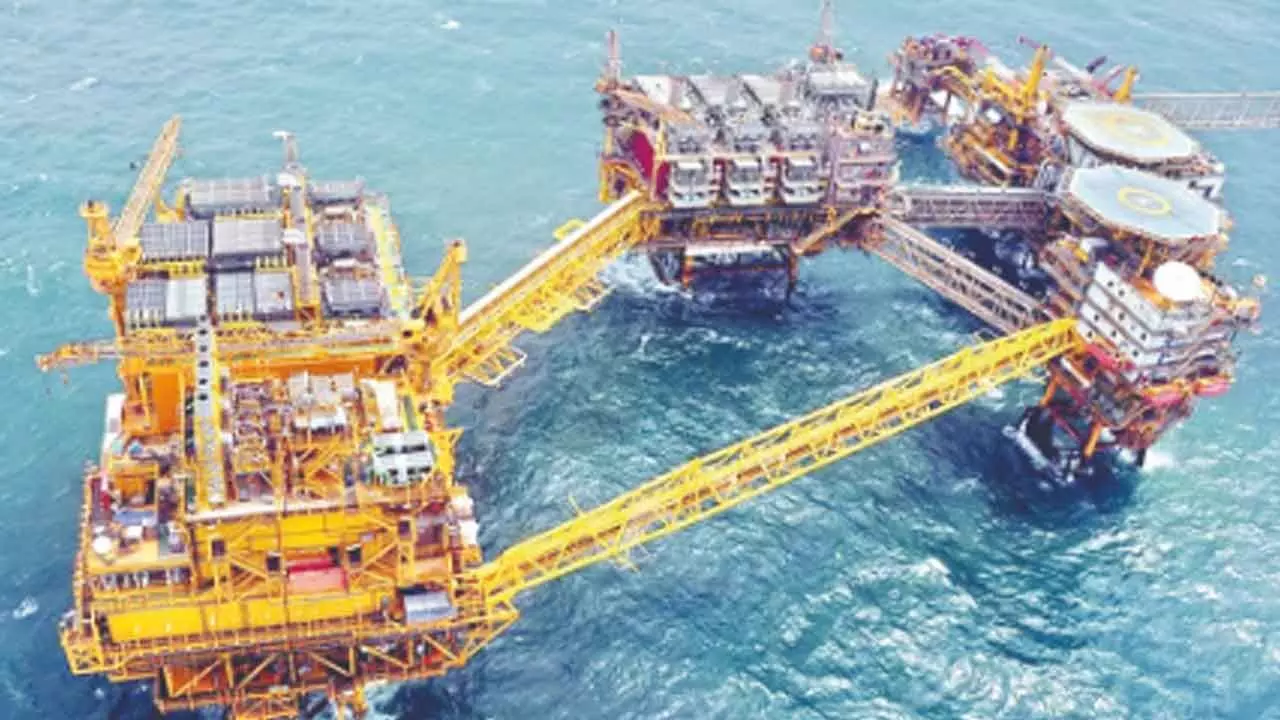ONGC, BP Set Out To Fuel Mumbai High Production
After years of declining output and failed privatisation attempts, ONGC partners with BP to unlock Mumbai High’s full potential, aiming for a significant boost in oil and gas production
ONGC, BP Set Out To Fuel Mumbai High Production

India’s largest oil field, Mumbai High, is set for a major revival as ONGC partners with global energy giant BP to reverse declining production. With BP providing technical expertise and ONGC investing in the upgrades, the deal aims to increase oil output by 44 per cent and gas production by 89 per cent over the next few years
US energy giant BP has signed a technical service contract with Oil and Natural Gas Corporation (ONGC) to boost declining production from Mumbai High, India's largest oil and gas field. This marks the culmination of multiple unsuccessful privatisation attempts and past agreements with firms like Marathon Oil and Occidental Petroleum.
BP has committed to increasing oil production by 44 per cent and gas output by 89 per cent in exchange for a fixed fee. The deal mirrors ONGC's 1998-99 agreement with Marathon Oil, which was designed to enhance production without transferring ownership. However, unlike BP, Marathon was required to invest its own capital in technological upgrades. In the BP arrangement, ONGC will bear all investment costs, while BP provides technical expertise. BP will receive a fixed fee for the first two years and later a share of the incremental production.
A past agreement with Marathon collapsed when ONGC modified the baseline production figures submitted to the Petroleum Ministry for approval. Marathon withdrew as the revised targets were never achieved. Other global energy firms, including Shell and Occidental Petroleum, had expressed interest in Mumbai High but demanded stakes, which Indian regulations did not allow.
With Mumbai High facing a steady decline in output, privatisation was considered at least twice in recent years. In 2018, a committee led by then-Niti Aayog Vice Chairman Rajiv Kumar proposed transferring Mumbai High and other fields to private or foreign companies. In 2021, the Petroleum Ministry suggested ONGC cede a 60 per cent stake and operational control of Mumbai High and Bassein fields to foreign firms. However, strong resistance from ONGC management stalled these plans.
In June 2023, ONGC invited bids from global firms with at least $75 billion in revenue for technical expertise to enhance Mumbai High's output. The tender offered a share of revenue from additional production and a fixed fee but no equity stake. BP and Royal Dutch Shell submitted expressions of interest, but only BP proceeded with a final bid.
ONGC announced BP as the selected technical service provider in January 2024. BP aims to boost crude production from the baseline 45.47 million tonnes to 65.41 million tonnes and gas production from 70.40 billion cubic meters (BCM) to 112.63 BCM. Production increases are expected from April 2025, with full impact visible by 2027-28. BP will receive a service fee based on a pre-agreed percentage of revenue from incremental production, subject to a 25 per cent cap. The initial contract spans ten years, extendable by five. BP's expert team will assess well performance, improve reservoir management, and optimize water injection and facility operations.
The deal could generate up to $10.3 billion in additional revenue, with the government expected to receive $5 billion in taxes and levies. Currently, Mumbai High produces approximately 132,265 barrels of oil per day and 13 BCM of gas annually. Without intervention, this output is projected to fall to 75,000 barrels per day and less than 4.5 million standard cubic meters per day (mmscmd) of gas by 2037-38.
Given that India imports over 85 per cent of its crude oil and half its natural gas, the BP agreement is strategically significant. Mumbai High, discovered in 1974 and operational since 1976, once peaked at 476,000 barrels per day and 28 BCM of gas in 1989. It currently accounts for 38 per cent of India's domestic crude production and 14 per cent of consumption.
ONGC estimates Mumbai High still holds 80 million tonnes (610 million barrels) of oil and over 40 BCM of gas. Since 2000, it has invested Rs46,315.32 crore in redevelopment projects to slow the field’s decline. However, production fell to 18.4 million tonnes in FY 2023-24 from 18.54 million tonnes the previous year, while gas output declined by 3.2 per centto 19.97 BCM. Despite previous failed privatisation efforts, ONGC sees the BP collaboration as a promising alternative to sustain and enhance Mumbai High’s output, securing India's energy future.

